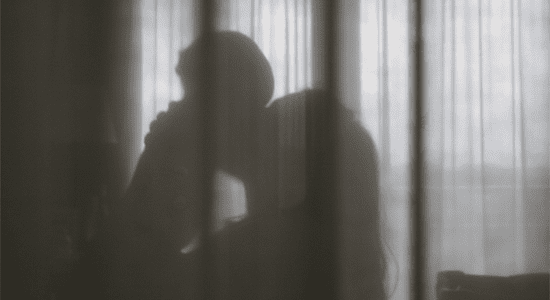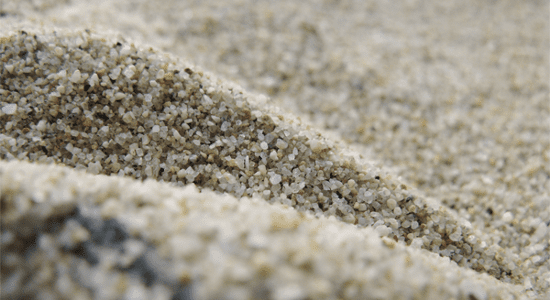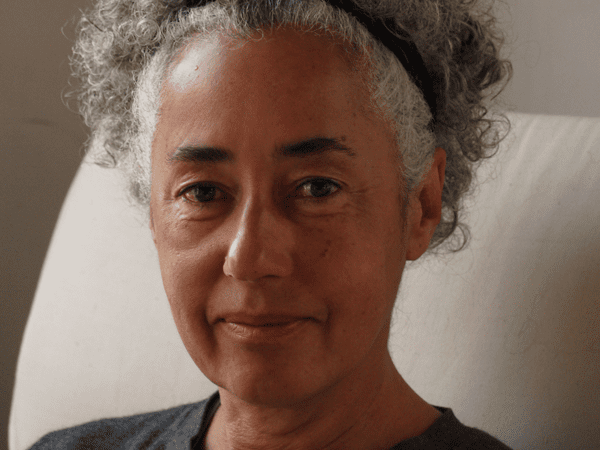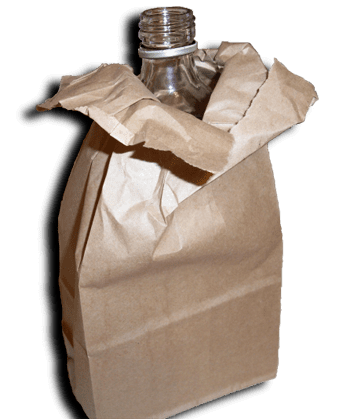my mother left me four flat rooms three washloads two fivefoot boys one tenfoot man when she went under she took her breasts her rippled hair she left me bonestuck bare they say i have my mother's mouth they say i have her eyes
Shorthand
Lunch at l’auberge
He arrives in murmuring blue tie puffed like a poised rattler He has brought a ruby flower scent of languorous hours "Have you never been to France?" His face is sluggish but his fingers fly He finds a dear spot behind her ear "Tell me. Tell me." Her eyes are ruby wine and his his eyes his eyes are the ports of Le Havre
Author of the Month: Cynthia Holz
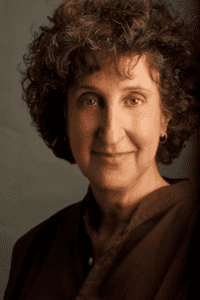
Tell us about yourself.
I began writing poetry at an early age and dreamed of becoming a writer, though I had no idea how to go about it. I grew up in New York City, the daughter of European Jewish immigrants, and came to Toronto in my mid-twenties to work as a journalist. Eventually I married a Newfoundlander, had a son, and started writing short stories. My first collection, Home Again, was published in 1989, which led to a job teaching creative writing at Ryerson. Soon after that, I switched to writing novels and have published five over the years, most recently Benevolence.
When did you realize you had a passion for writing?
At seven, I was a lonely, introspective child. My second grade teacher at P.S. 6 in the Bronx encouraged me to write poems and recite poetry to her during lunch hours and after school. With her guidance I discovered the joy of euphonious words and a literary world I longed to be a part of.
What pieces of writing/authors have had the greatest impact on you?
I’ve been influenced by a wide range of American and Canadian fiction, including works by Marilynne Robinson, Flannery O’Connor, Doug Glover, and Alice Munro. Anything evocative and beautifully written that has something to say about the human condition inspires me. Recently, I was impressed by Linda Spalding’s novel The Purchase, Anthony Marra’s A Constellation of Vital Phenomena, and The Unlikely Pilgrimage of Harold Fry by Rachel Joyce.
How and when do you find time to write?
When writing a novel, I go at it every morning, seven days a week—unless life intervenes and turns my plans upside-down, which happens frequently. My routine is to write a few hours before lunch, have a break, review and revise what I’ve written, then move on to other tasks.
What has been some of the biggest challenges you’ve faced as a writer?
It’s always challenging to maintain confidence in my subject matter and writing style in the face of rejection or pressure to write what others think will sell. Astute criticism can really help improve a work-in-progress, but sometimes it’s not easy to find or even recognize.
How have you changed as a writer over the years?
What I write about has changed over time, so that the romantic entanglements that interested me as a young writer don’t really engage me now. Larger questions of purpose, morality, and how to behave in the world are what’s spinning round in my head these days.
Edward
Edward laughs like a loon. He sits splay-legged on the beach on a perfect summer day with the sun high and hot and the sea a shimmer of slate-blue. Beside him his best friend Harry wears a smile as broad as the slick of sand they sit upon. This is the best moment in both of their lives.
They have been walking. A trail of footsteps marks the way they have come—from beyond the rocks where the beach curves out of sight. They have lost their shoes and hats and their uniforms are a mess of tears and dark stains. But they are laughing nonetheless. Harry’s arm, alongside Edward’s (because now they are lying side by side, becoming quiet) is dark and smooth and gleams with youth and health in the sun. Beside his, Edward’s arm is smaller, and while his brown skin, painted with a palette of sun and wind, is darker than it was, it is still lighter than Harry’s. His bicep does not roll in his arm like Harry’s, but he is muscular and strong.
Harry’s other arm is loose and broken. The pain has started and now he moans rather than laughs.
“We’ll be alright,” says Edward, gripping his friend’s good hand. “Hold on. Help will come.”
Beyond the rocks where the coastline curves from view, the beach is strewn with the bloated and torn bodies of boys and men. These lie among the detritus of their smashed ship. All of them, ship and boys and men had been blown high into a smoke filled sky.
The noise of the blast still rang in their ears and the shriek and scrape of tearing metal, the horror of the screams of men were the cacophony of nightmares. The ship had seemed to rise from the water. They’d been sorting supplies together, in a box container, side by side as they are now. They had never let go of each other, holding wrist and hand like children because each knew his survival depended on the other.
Harry and Edward found life jackets and desperate, clung to a piece of floating wreckage. And all the while the awful dark water had roiled and heaved in the stinking air and the screams of dying men grew mercifully, tragically less. “This is a miracle of God,” said Harry, when they knew how alone and alive they were.
They lie side by side upon the sand. Edward’s face is turned to Harry and he holds Harry’s good hand whose palm and fingers swamp his own. Harry’s face is turned to the blue sky though his eyes are squeezed shut. Tears run down his cheeks and he moans his pain. Edward makes soft sounds of comfort, like a mother, learned from the love and caring that was given to him long before his memory formed. He hears Celia in the soothing murmur though it comes from his own lips.
He’d signed up for the duration but nobody thought it would keep going like this. He hopes Celia still gets her share of his wages. He hopes she is safe. He prays that she still loves him. ‘When I come back I’ll be a man that can get a job,’ he’d told her. ‘The government will look after us because of all the sacrifice.’ That was what he’d believed.
It seems a lifetime ago now. It was a few lives he’d lived on that ship that is now in pieces scattered from here to Timbuktu. He doesn’t let go of Harry’s hand even though he’s stopped moaning. “No V.C. for us, Harry,” Edward whispers. The sea is calm now, waves rolling up onto the beach and washing back, the soothing rhythm a comfort. It’s good not to be on the water.
Edward’s legs are damaged, but he won’t know that until he tries to stand up. They’ve lain on the sand for more than an hour since making their way from the wreckage, but they won’t rest for hours yet.
Emerging Author of the Month: Sheila Murray
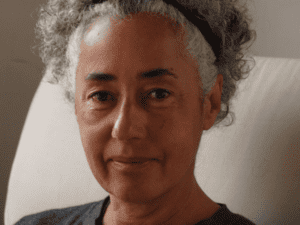
Tell us about yourself.
My English mother and Jamaican father raised me in England until I was seventeen when we all moved to Toronto. Since then I’ve earned a degree in Journalism and a Masters in Immigration and Settlement Studies. Now I am older, wiser, and certain of a couple of things: life gets more complicated and there’s never enough time.
Tell us about the piece you’ve decided to share.
The piece I’ve included here is an excerpt from a finished book (supported by DD). What you’ll read is about a man whose life—past and present—is chronicled throughout the novel. The book’s central story is the first eighteen months of a young man’s challenging, contemporary urban experience. This novel, Edward, is about relationships and race, and how some things change, but not all of them.
When and why did you realize you had a passion for writing?
When I was a kid I’d win essay contests at school. I liked the prizes, but I hated having to read the pieces to the school assembly. I was so shy that I couldn’t force my voice above a whisper, so, despite the microphone, the audience had to endure until it was over, signaled by my leaving the stage. What I’ve learned is that if you’re a good reader (and I’m told that I am), hearing your own written words spoken into a silent room full of listening people is actually really nice.
What pieces of writing/authors have had the greatest impact on you?
I read lots of Iris Murdoch when I was a young teenager. I love the surprises in her books, how her people go about their lives in the ordinary way until everything spins out of control and they’re suddenly overwhelmed and steered by buried passions that they can no longer keep quiet. Even though Murdoch’s intellectual discourse sailed way over my head, and I’d lose track of the dozens of characters and muddle the plot, the core human stuff was always so compelling that I loved it all.
What kind of writer do you aspire to be?
I’d like to one day write a paragraph that is as good as any page of Marilynne Robinson’s Home. She has an extraordinary ability to reach right through to the source of human feeling.
How and when do you find time to write?
I am usually self-employed. When I’m not too busy I can create a schedule that gives me time to write in the mornings—my best time. If I can do that for an hour or more a day, then I’m a happy writer.
Alcohol for the Alcoholic
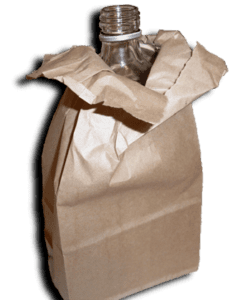
I am in the grey dingy room fiddling with the hospital bands on my left wrist. The newest one with today’s date. The four previous ones, old and worn out, but I refused to take them off. They represented my current paternal obsession. Earphones in my ears, my iPod was syncing with my thoughts as the songs changed. My iPod on shuffle, the randomness of the function too coincidental, makes me uneasy. Shifting in my hard seat, I lightly tap the two sideways triangles facing the right. “Daddy Little Girl” by J Cole came on.
“Just because them n****s f*** you, don’t mean they love you . . . she said don’t preach to me . . . ”
I pressed the triangles again.
“Tears for ODB, drug induced poetry.”
I pressed. Again.
“I wasn’t picky I would take any male father figure.”
Were the words that decided to invade my mind. I wondered with answers why the words chose to mean something to me. I ignored them and they would came back; in different forms, in different words, in different orders. They were shape shifters.
Metamorphic.
Like the men I chose.
Every day I would find a new one. Every day, one would stick out to me. It could be something as small as the deep bass of his voice, or something bigger like the choice of his music or the perfect words that came out of his mouth at the right time without any indication from me. Whatever it was, it would act like the bait on the end of the sharp hook on a fishing rod. It would pierce into my heart. The curved part deep into my vast void.
Sometimes I wondered if they could see it, if they could see what was lacking in me. I wonder if they were drawn to me like I was magnetically pulled to them. My negative void to their positive love.
Love.
Is what they gave me. It is what I wanted the most. I was greedy for it, fiending for it. It was beautiful. Men, who didn’t know me, knew nothing about me, gave me love. So willingly and genuinely. Maybe they saw my soul, as if my soul was the flame of a candle in a clear jar, exposed yet protected.
*
I came for him.
While I waited in the ER, I observed the people in this wide claustrophobic space. I was watching a very familiarly odd couple. She was a young, pretty girl and he was an older man. Her wooden cross lying on her neck. His neck, wrists and fingers draped in multiple gold plated accessories. Immediately I knew the essence of their relationship. I have been in them many of times.
I am in one now.
I knew her story. She didn’t have a steady father. He walked out on her and her mother’s lives when she was seven-years-old. He randomly popped in and out of her life for five years, jack-in-the-box. Around the age of puberty her body developed and the little boys in school were attracted to her. But she wasn’t attracted to them. Around high school, which I assume she is in now, she developed a deep longing and fascination for the older men that were now looking her way. This man she is with now, told her how beautiful she is and how he could take care of her. The idea of someone taking care of her was both laughable and tempting. She danced with the idea, they waltzed, she was in control in this three point repetitive dance until the music switched and she was caught in a fast tango, confused in the footwork, dizzy in the twirls, seduced by his touch and slow gazes, she tried to regain control but he was just too strong and knew all her weaknesses. He utilized the environment, taking her to edge of the dance floor, dragging her on the floor, lifting her in the air. He dipped her one final time, her back arched, her head almost touching the ground. She came up slowly. I know the outcome of the dance by the way his hand was on her thigh and the subtle disgust behind her serene face.
I was in the same relationship as her.
I checked the time.
I saw him, he was on his break heading toward the Tim Horton’s. I rose out of my seat and followed. Internally I was giddy; externally I was cool, calm and collected. I was behind him in the line. I pushed in to him, my breasts lightly against his back. He turned around and smiled at me. It was so bright I was blinded momentarily.
He turned back around. My warmth taken away.
I recited his order with him silently as he spoke to the cashier. He grabbed his coffee with two sugars and one milk, his fruit bran muffin, sliced in half, warmed in the microwave for thirty seconds with low salt butter. He turned around winked at me and left.
My heart melted.
That was our relationship. A wink and a smile from an older man made me come here, five days a week, Monday to Friday at 11:22 am.
All my imaginary father-daughter relationships were like that.
That girl was my reflection of what I could have been, what I can become and what I was, except I was blessed with an innate ability to deeply understand my self-worth. I understood that this body was as sacred as the Quran, holy as the Bible more complex than the Bhagavad Gita. I was wise enough not to dance with the devil.
I was overwhelmed with withdrawal and swallowed by sadness. He was gone. My moment with him was gone.
Moments are not forever. Tomorrow I will be back and the next day and the next until I find another host. I was his parasite, feeding off his vintage soul.
I went back to my seat and waited for my name to be called. Went back to my music.
*
After my check-up, I found myself at his door with fifteen white roses in my right hand. I was now twenty-one. Each rose represented a year of abandonment. In my left hand, a brown paper bag with a bottle of Jameson. The roses for me, the bottle for us.
He opens the door.
He sees me standing here. No words needed because it would distract the silent communication and other emotions rebounding back and forth.
This is a start.
I didn’t fall into his arms. I didn’t move. I just stood there.
The men all disappeared for that moment.
I forgave myself for the hatred and anger he created within me for that moment.
I didn’t know what would happen after this moment and I didn’t care.
My pains, my sorrow, my hurt, flowed down the drain, like water from a never-ending faucet. My eyes the faucets.
My father welcomed me in.
I looked up and the sky looked like the ocean, the clouds the waves, the sun looked peculiar to me. It was hiding behind two clouds, half of it peeking out. God was spying on me.
I waited for an invitation. None came. I felt the sun on my face. I took the first step into his house.
We are going to drown our demons with this alcohol.
I am in the grey dingy room fiddling with the hospital bands on my left wrist. The newest one with today’s date. The four previous ones, old and worn out, but I refused to take them off. They represented my current paternal obsession. Earphones in my ears, my iPod was syncing with my thoughts as the songs changed. My iPod on shuffle, the randomness of the function too coincidental, makes me uneasy. Shifting in my hard seat, I lightly tap the two sideways triangles facing the right. “Daddy Little Girl” by J Cole came on.
“Just because them n****s f*** you, don’t mean they love you . . . she said don’t preach to me . . . ”
I pressed the triangles again.
“Tears for ODB, drug induced poetry.”
I pressed. Again.
“I wasn’t picky I would take any male father figure.”
Were the words that decided to invade my mind. I wondered with answers why the words chose to mean something to me. I ignored them and they would came back; in different forms, in different words, in different orders. They were shape shifters.
Metamorphic.
Like the men I chose.
Every day I would find a new one. Every day, one would stick out to me. It could be something as small as the deep bass of his voice, or something bigger like the choice of his music or the perfect words that came out of his mouth at the right time without any indication from me. Whatever it was, it would act like the bait on the end of the sharp hook on a fishing rod. It would pierce into my heart. The curved part deep into my vast void.
Sometimes I wondered if they could see it, if they could see what was lacking in me. I wonder if they were drawn to me like I was magnetically pulled to them. My negative void to their positive love.
Love.
Is what they gave me. It is what I wanted the most. I was greedy for it, fiending for it. It was beautiful. Men, who didn’t know me, knew nothing about me, gave me love. So willingly and genuinely. Maybe they saw my soul, as if my soul was the flame of a candle in a clear jar, exposed yet protected.
*
I came for him.
While I waited in the ER, I observed the people in this wide claustrophobic space. I was watching a very familiarly odd couple. She was a young, pretty girl and he was an older man. Her wooden cross lying on her neck. His neck, wrists and fingers draped in multiple gold plated accessories. Immediately I knew the essence of their relationship. I have been in them many of times.
I am in one now.
I knew her story. She didn’t have a steady father. He walked out on her and her mother’s lives when she was seven-years-old. He randomly popped in and out of her life for five years, jack-in-the-box. Around the age of puberty her body developed and the little boys in school were attracted to her. But she wasn’t attracted to them. Around high school, which I assume she is in now, she developed a deep longing and fascination for the older men that were now looking her way. This man she is with now, told her how beautiful she is and how he could take care of her. The idea of someone taking care of her was both laughable and tempting. She danced with the idea, they waltzed, she was in control in this three point repetitive dance until the music switched and she was caught in a fast tango, confused in the footwork, dizzy in the twirls, seduced by his touch and slow gazes, she tried to regain control but he was just too strong and knew all her weaknesses. He utilized the environment, taking her to edge of the dance floor, dragging her on the floor, lifting her in the air. He dipped her one final time, her back arched, her head almost touching the ground. She came up slowly. I know the outcome of the dance by the way his hand was on her thigh and the subtle disgust behind her serene face.
I was in the same relationship as her.
I checked the time.
I saw him, he was on his break heading toward the Tim Horton’s. I rose out of my seat and followed. Internally I was giddy; externally I was cool, calm and collected. I was behind him in the line. I pushed in to him, my breasts lightly against his back. He turned around and smiled at me. It was so bright I was blinded momentarily.
He turned back around. My warmth taken away.
I recited his order with him silently as he spoke to the cashier. He grabbed his coffee with two sugars and one milk, his fruit bran muffin, sliced in half, warmed in the microwave for thirty seconds with low salt butter. He turned around winked at me and left.
My heart melted.
That was our relationship. A wink and a smile from an older man made me come here, five days a week, Monday to Friday at 11:22 am.
All my imaginary father-daughter relationships were like that.
That girl was my reflection of what I could have been, what I can become and what I was, except I was blessed with an innate ability to deeply understand my self-worth. I understood that this body was as sacred as the Quran, holy as the Bible more complex than the Bhagavad Gita. I was wise enough not to dance with the devil.
I was overwhelmed with withdrawal and swallowed by sadness. He was gone. My moment with him was gone.
Moments are not forever. Tomorrow I will be back and the next day and the next until I find another host. I was his parasite, feeding off his vintage soul.
I went back to my seat and waited for my name to be called. Went back to my music.
*
After my check-up, I found myself at his door with fifteen white roses in my right hand. I was now twenty-one. Each rose represented a year of abandonment. In my left hand, a brown paper bag with a bottle of Jameson. The roses for me, the bottle for us.
He opens the door.
He sees me standing here. No words needed because it would distract the silent communication and other emotions rebounding back and forth.
This is a start.
I didn’t fall into his arms. I didn’t move. I just stood there.
The men all disappeared for that moment.
I forgave myself for the hatred and anger he created within me for that moment.
I didn’t know what would happen after this moment and I didn’t care.
My pains, my sorrow, my hurt, flowed down the drain, like water from a never-ending faucet. My eyes the faucets.
My father welcomed me in.
I looked up and the sky looked like the ocean, the clouds the waves, the sun looked peculiar to me. It was hiding behind two clouds, half of it peeking out. God was spying on me.
I waited for an invitation. None came. I felt the sun on my face. I took the first step into his house.
We are going to drown our demons with this alcohol.

